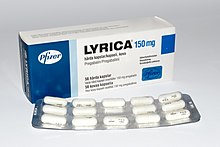From 1st April 2019, amendments to the Misuse of Drugs Regulations 2001 and the Safe Custody Regulations 1973 come into force which means that pregabalin and gabapentin will be reclassified as Schedule 3 Controlled Drugs (CDs).
The reclassification follows Government consultation and recommendations from the Advisory Council on the Misuse of Drugs for additional safeguards to be put in place because of concerns around the misuse of these drugs.
Gabapentin and pregabalin have been in use in the UK for nearly twenty years. In that time there has been huge growth in the use of these clinically effective drugs. Whilst originally licensed for control of epilepsy, they now have a number of indications; including the management of neuropathic pain and for anxiety.

Unfortunately, these drugs are also now diverted, misused, and have a street value because they produce feelings of euphoria, relaxation and calmness.
There is a growing illicit market, and pregabalin and gabapentin are also being bought online from unregulated websites. They are known to enhance the euphoric effects of other drugs, including opiates.
There is an increased risk of harm when they are used in combination with opiates and/or alcohol and there has been an increase in the number of deaths in which either pregabalin or gabapentin have been recorded on the death certificate (111 deaths in 2016).
Requirements for gabapentin and pregabalin from 1st April 2019 are as follows:
| Controlled Drug | Prescription requirements | Prescription validity | Safe custody requirements | Entry in CD register | Emergency supplies and NUMSAS | Repeat dispensing |
| Gabapentin | ✓ | 28 days | × | × | × | × |
| Pregabalin | ✓ | 28 days | × | × | × | × |
In addition to the above, The Department of Health and Social Care has issued strong recommendations that the maximum quantity of Schedule 3 drugs prescribed should not exceed 30 days.
FAQs
Q. When gabapentin and pregabalin become Schedule 3 CDs, will they need to be stored in the CD cabinet?
A. No, because gabapentin and pregabalin will be exempt from the safe custody requirements.
Q. Will records need to be kept in a CD register of receipt and administration of these drugs?
A. No, because entries in a CD register are only a legal requirement for Schedule 1 and 2 CDs. Existing organisational policy will determine if records are kept for Schedule 3 CDs.
Q. Will exemption for emergency supply from a pharmacy to people with epilepsy (as with phenobarbital) be in place?
A. No. Community pharmacy teams will not be permitted to provide emergency supplies of pregabalin or gabapentin. Whilst an exception has been made for phenobarbital, no such exception exists for pregabalin or gabapentin. It will therefore be increasingly important that individuals on these medications have their stocks of these medicines well managed.
Q. Can gabapentin and pregabalin be supplied in a compliance aid?
A. There are no restrictions in placing CDs into compliance aids. However, the supplying pharmacist needs to be satisfied that the drugs will remain stable when placed outside its original container. Also, risk assessments should be performed in the care environment to ensure appropriate safe storage.
1) https://psnc.org.uk/media/2019/03/PSNC-Briefing-010.19-Reclassification-of-gabapentin-and-pregabalin-as-Controlled-Drugs..pdf
2) https://psnc.org.uk/media/2019/02/Pregabalin-and-Gabapentin-Briefing-Note-12-Feb-2019.pdf
3) https://www.england.nhs.uk/south/media/sites/6/2018/01/nhs-cd-newsletter-pregabalin.pdf
